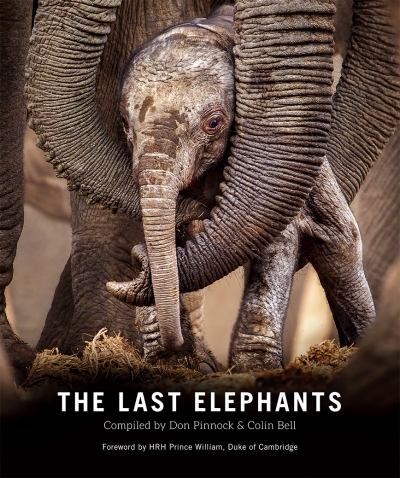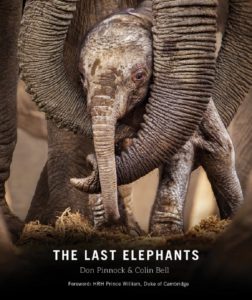The massacre of nature’s ‘architects’
 BY ELISE TEMPLEHOFF - 8 APRIL 2019 - BEELD
BY ELISE TEMPLEHOFF - 8 APRIL 2019 - BEELD
This encyclopaedic book sends out a powerful message to give elephants the highest protection status, writes Elise Tempelhoff.
The LAST ELEPHANTS Compiled by Don Pinnock & Colin Bell, PENGUIN RANDOM HOUSE, R490
This comprehensive manuscript, with its outstanding photos has the appearance of a coffee table book and was compiled after the revelations of the 2016 Great Elephant Census which estimated that there are fewer than 450 000 elephants left in Africa. In less than 100 years, Africa’s elephant population of between 3 and 4 million fell to a handful.
An elephant is killed every 15 to 20 minutes somewhere in Africa: either by poisoning (such as those at Hwange that are still poisoned with cyanide) poachers AK47s or large calibre hunting rifles.
The Census was undertaken by Dr. Mike Chase and Kelly Landen of Elephants Without Borders. The result of the census sent shock waves through the international conservation community, prompting Bell and Pinnock to get 40 experts (scientists, rangers, poets, writers, investigative journalists, photographers, criminologists and conservationists) to donate contributions to this book.
Dr. Don Pinnock, criminologist, historian and environmental journalist and Colin Bell, environmental activist and seasoned field guide, were the main compilers and authors.
In the inside flap of the book, The Last Elephants, they write:
“Is that title prophetic? We don’t hope so. But the signs are worrying.”
The authors say they have three objectives with the book:
- That readers from around the world will enjoy this document “about the continent’s last elephants” and the in-depth information on these magical mammals and the photos;
- That consumers of ivory – in China, Vietnam, Laos and Japan – will get the message that Africa is drenched with elephant blood. “We hope these countries will ban the trade and use of ivory after that.
- Third, they dedicated the book to all who sacrificed their lives for the welfare and survival of elephants.
The Last Elephants consist of 42 chapters. Each is written by an expert. The photos are of the highest quality: those of elephant trousers that trap dust in the Namib, in Mapungubwe, those reaching to the greenest leaf tops in Manapoele, in the Okavango Delta, the Great Rift Valley in Kenya and of the virtually toothless elephants of Addo. Photos of elephant carcasses whose tusks have just been cut out, loads of wire snares removed from the field and piles of ivory in Kenya being burned are startling.
The book sends out a powerful message to the Convention on International Trade in Endangered Species (Cites) to offer elephants the highest protection status at its next summit in Sri Lanka in May.
The authors hope a complete ban will be placed on the trade in living elephants or any of their body parts, including ivory. The battle to place all elephants on Appendix 1 of Cites has been going on for several decades. Some Elephant experts believe in one of the chapters on Cites, that poaching of these highly intelligent, gentle and social animals – could be halted by trade, apparently under strict conditions, but this is a breeding ground for corruption.
The book starts with a quote by Brian Jackman, Britain’s leading African wilderness writer:
“Africa changes you forever, like nowhere on earth. Once you have been there, you will never be the same. But how do you start to describe its magic to someone who has never felt it? How can you explain the fascination of this dusty continent, whose oldest roads are elephant paths?"
Iain Douglas-Hamilton, elephant conservationist and zoologist, writes that when countries burn ivory, it is a symbolic but also practical gesture that their tusks have no monetary value but are only essential for the survival of elephants.
The book is full of information and facts:
In chapter 8, James Currie, an environmental manager, writes about the danger of trophy hunting. He says in the elephant community the hunting of a trophy elephant bull is equivalent to wiping out wisdom built up over generations This is a huge loss for the rest of the herd.
Colin Bell writes in the next chapter how the elephant bulls with the great tusks were hunted across Africa and how it affected elephant populations, but also the psychological impact it had on members of the remaining herd.
Garth Thompson, professional field guide, writes in detail in chapter 12 how elephants fit into ecology. He calls them the “architects” of nature. He describes how they create waterholes for other wildlife, how they fertilize the veld and distribute seeds . Elephants also create “highways” in the wild that allow other animals to travel to food and water. He writes they are the true tree planters and not as many people complain: the destroyers of large and old trees.
In chapter 13, the growing conflict between man and elephant is described, and a solution is also suggested by involving communities directly in the conservation of animals. In fact, the census recorders, who flew 300 000 miles across Africa, also counted 1.3 million cattle and more than 200 temporary poachers' camps.
An entire chapter is devoted to illustrating how elephant poaching finances armed conflict, leads to terrorism and how it is linked to drug trafficking.
On the last page printed in white letters on a black background, WildlifeDirect’s Dr Paula Kahumbu ,founder of the organization #HandsOffOurElephants writes:
“It’s war now . We are losing our national heritage; we are losing our elephants. We have to act now.”
Below the starry sky on this page are the vague, grey shapes of Africa’s last elephants, visible as they walk away in the dark.
Once you have read this book, you will never look at elephants in isolation again.
Elise Tempelhoff is a specialist environmental journalist.
*Translated from Afrikaans. Read the original article here: https://conservationaction.co.za/wp-con ... 1001-9.pdf




